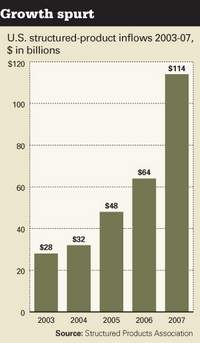Matthew Hougan
Kudos to Murray Coleman for his timely story last Friday on the threat posed to investors in the Lehman Brothers' Opta ETNs.
Since the first exchange-traded note launched in 2006, we've been reminding investors that ETNs are debt notes. And as debt notes, if the underwriting bank goes bankrupt, you lose out. That may happen with Lehman and its trio of Opta-branded ETNs, unless another firm steps in to make good on the promises, or the notes are otherwise excluded from the bankruptcy filing.
Remember: With an ETN, you don't own any share in physical assets. All you own is a promise from the underwriting bank. Unless the notes are somehow "made good," any investor holding a Lehman ETN today will be a creditor of the firm, just like folks holding other forms of Lehman debt. The likelihood that noteholders will receive full value for their shares in a liquidation is close to zero.
Importantly, this credit risk does not apply to exchange-traded funds at all.
An ETF is required to hold physical assets on its books, which are kept separate from the product issuer. For instance, the S&P 500 SPDR (AMEX: SPY) owns shares in each of the 500 stocks in the S&P 500 Index. If you own a share of SPY, you own a pro rata stake in each of those 500 stocks. Even if the product issuer (SSgA) went bankrupt, you would still own those shares.
That is not the case with an ETN.
That said, all the other ETN issuers appear to be in good shape on the credit front. The list of banks backing ETNs besides Lehman includes Barclays Capital, Deutsche Bank, Goldman Sachs, HSBC, Merrill Lynch (now Bank of America), Swedish Export Credit Corp. and UBS. All those banks appear to be solid right now, assuming the Merrill Lynch merger goes through.
Perhaps that's one of the reasons there were few assets in the Lehman products; people may have had those concerns already. This is a situation where investors must look at the credit issuer on an individual basis.
As Jim said, I have a bet with Don Friedman right now that the DJIA will dip below 10,000 before it rises above 15,000. We made the bet about a year ago. $100 is on the line.
I don't want to win the bet, for obvious reasons. And despite the current developments, I'm not sure I will. Things are really bad, but you get the feeling (as Jim suggests) that we're closing in on a point where there will be significant money to be made in the stock market.
Interesting times.
Monday, September 15, 2008
Subscribe to:
Post Comments (Atom)




No comments:
Post a Comment